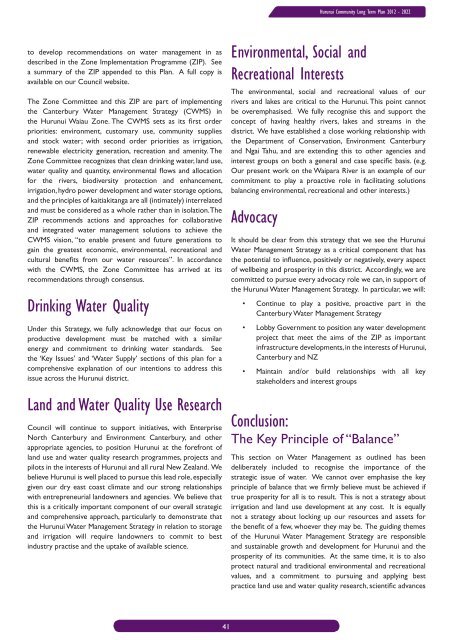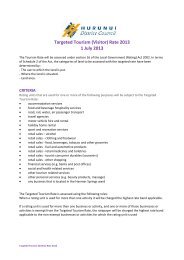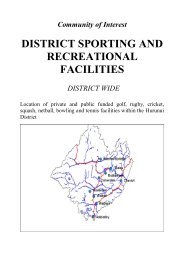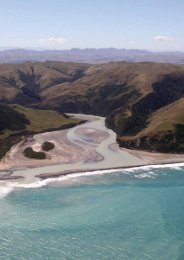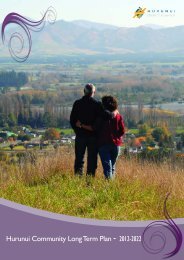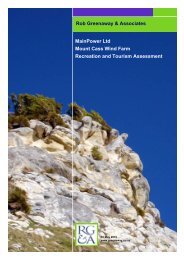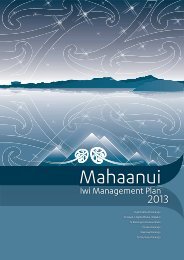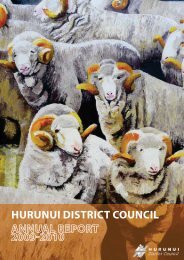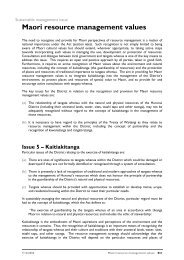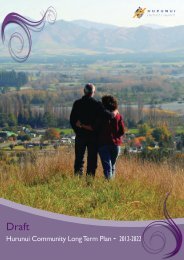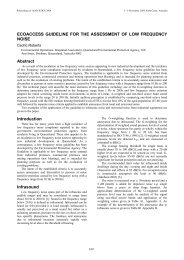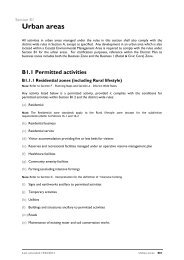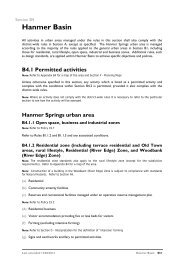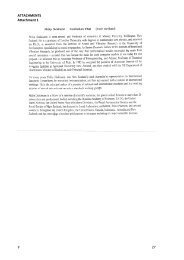Long Term Community Plan 2012-2022 - Hurunui District Council
Long Term Community Plan 2012-2022 - Hurunui District Council
Long Term Community Plan 2012-2022 - Hurunui District Council
Create successful ePaper yourself
Turn your PDF publications into a flip-book with our unique Google optimized e-Paper software.
<strong>Hurunui</strong> <strong>Community</strong> <strong>Long</strong> <strong>Term</strong> <strong>Plan</strong> <strong>2012</strong> - <strong>2022</strong><br />
to develop recommendations on water management in as<br />
described in the Zone Implementation Programme (ZIP). See<br />
a summary of the ZIP appended to this <strong>Plan</strong>. A full copy is<br />
available on our <strong>Council</strong> website.<br />
The Zone Committee and this ZIP are part of implementing<br />
the Canterbury Water Management Strategy (CWMS) in<br />
the <strong>Hurunui</strong> Waiau Zone. The CWMS sets as its first order<br />
priorities: environment, customary use, community supplies<br />
and stock water; with second order priorities as irrigation,<br />
renewable electricity generation, recreation and amenity. The<br />
Zone Committee recognizes that clean drinking water, land use,<br />
water quality and quantity, environmental flows and allocation<br />
for the rivers, biodiversity protection and enhancement,<br />
irrigation, hydro power development and water storage options,<br />
and the principles of kaitiakitanga are all (intimately) interrelated<br />
and must be considered as a whole rather than in isolation. The<br />
ZIP recommends actions and approaches for collaborative<br />
and integrated water management solutions to achieve the<br />
CWMS vision, “to enable present and future generations to<br />
gain the greatest economic, environmental, recreational and<br />
cultural benefits from our water resources”. In accordance<br />
with the CWMS, the Zone Committee has arrived at its<br />
recommendations through consensus.<br />
Drinking Water Quality<br />
Under this Strategy, we fully acknowledge that our focus on<br />
productive development must be matched with a similar<br />
energy and commitment to drinking water standards. See<br />
the ‘Key Issues’ and ‘Water Supply’ sections of this plan for a<br />
comprehensive explanation of our intentions to address this<br />
issue across the <strong>Hurunui</strong> district.<br />
Land and Water Quality Use Research<br />
<strong>Council</strong> will continue to support initiatives, with Enterprise<br />
North Canterbury and Environment Canterbury, and other<br />
appropriate agencies, to position <strong>Hurunui</strong> at the forefront of<br />
land use and water quality research programmes, projects and<br />
pilots in the interests of <strong>Hurunui</strong> and all rural New Zealand. We<br />
believe <strong>Hurunui</strong> is well placed to pursue this lead role, especially<br />
given our dry east coast climate and our strong relationships<br />
with entrepreneurial landowners and agencies. We believe that<br />
this is a critically important component of our overall strategic<br />
and comprehensive approach, particularly to demonstrate that<br />
the <strong>Hurunui</strong> Water Management Strategy in relation to storage<br />
and irrigation will require landowners to commit to best<br />
industry practise and the uptake of available science.<br />
Environmental, Social and<br />
Recreational Interests<br />
The environmental, social and recreational values of our<br />
rivers and lakes are critical to the <strong>Hurunui</strong>. This point cannot<br />
be overemphasised. We fully recognise this and support the<br />
concept of having healthy rivers, lakes and streams in the<br />
district. We have established a close working relationship with<br />
the Department of Conservation, Environment Canterbury<br />
and Ngai Tahu, and are extending this to other agencies and<br />
interest groups on both a general and case specific basis. (e.g.<br />
Our present work on the Waipara River is an example of our<br />
commitment to play a proactive role in facilitating solutions<br />
balancing environmental, recreational and other interests.)<br />
Advocacy<br />
It should be clear from this strategy that we see the <strong>Hurunui</strong><br />
Water Management Strategy as a critical component that has<br />
the potential to influence, positively or negatively, every aspect<br />
of wellbeing and prosperity in this district. Accordingly, we are<br />
committed to pursue every advocacy role we can, in support of<br />
the <strong>Hurunui</strong> Water Management Strategy. In particular, we will:<br />
• Continue to play a positive, proactive part in the<br />
Canterbury Water Management Strategy<br />
• Lobby Government to position any water development<br />
project that meet the aims of the ZIP as important<br />
infrastructure developments, in the interests of <strong>Hurunui</strong>,<br />
Canterbury and NZ<br />
• Maintain and/or build relationships with all key<br />
stakeholders and interest groups<br />
Conclusion:<br />
The Key Principle of “Balance”<br />
This section on Water Management as outlined has been<br />
deliberately included to recognise the importance of the<br />
strategic issue of water. We cannot over emphasise the key<br />
principle of balance that we firmly believe must be achieved if<br />
true prosperity for all is to result. This is not a strategy about<br />
irrigation and land use development at any cost. It is equally<br />
not a strategy about locking up our resources and assets for<br />
the benefit of a few, whoever they may be. The guiding themes<br />
of the <strong>Hurunui</strong> Water Management Strategy are responsible<br />
and sustainable growth and development for <strong>Hurunui</strong> and the<br />
prosperity of its communities. At the same time, it is to also<br />
protect natural and traditional environmental and recreational<br />
values, and a commitment to pursuing and applying best<br />
practice land use and water quality research, scientific advances<br />
41


